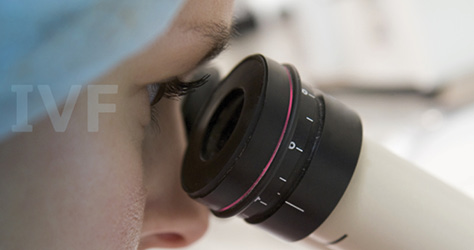If you’ve been trying to get pregnant for a while, you may be starting to think about fertility treatment.
Here’s a quick guide to the best-known, IVF.
At a glance
- IVF is the best treatment to deal with a range of fertility problems
- In 2010, IVF worked for 32.2% for women under 35
- Try to find out as much as you can about the treatment, the risks associated with it and the chances of success

Who is IVF best for?
IVF is the best treatment to deal with a range of fertility problems:
- Blocked or damaged fallopian tubes – with IVF eggs taken direct from the ovary, fertilised and implanted straight into the uterus (womb), avoiding the need for fallopian tubes
- Low sperm count or poor sperm movement – by mixing eggs and sperm together in a laboratory, it’s much easier for sperm to fertilise an egg. Then it’s popped straight into the womb
- Unexplained infertility – when doctors don’t know why couples can’t conceive, IVF is often the best solution
What’s involved in IVF?
IVF involves a number of processes that begins with drugs used to help produce as many healthy eggs as possible.
You’ll then be given a series of daily hormone injections for about 12 days. These will help to stimulate the ovaries and help them to release a greater number of mature eggs that the fertility drugs have helped develop.
Am I ready for IVF?
While IVF can be a great solution, it’s important to go into this treatment with your eyes open. IVF can be physically and emotionally demanding, putting a toll on your body and relationship. If you decide to go private, there’s the financial element too.
“When it works, IVF is a fantastic treatment for couples who would not be able to get pregnant naturally,” says Richard Smith, Consultant Obstetrician. “But it’s a complex, invasive procedure that can prove quite stressful. A cycle can go on for seven weeks, and includes many visits to the fertility clinic.”
The good news is, you really get well looked after when you do IVF, with most couples being offered really helpful counselling. The National Institute for Health and Care Excellence (NICE) recommends that counselling should be offered before, during and after IVF treatment.
“Some couples find fertility problems start dominating their lives, and it’s hard to get a break,” says Smith. “People often need to do further cycles and of course, they unfortunately may not get pregnant. You can protect your relationship by approaching IVF as a couple, supporting each other throughout and asking for help when you need it.”
What are the success rates for IVF?
The success rate will depend on your age, with a higher success rate in younger couples. In 2017, own-egg IVF worked for over 25% for women under 35, falling to less than 5% for women 45 or over. The success rate is much higher for women over 45 using donor eggs.
Where can I get IVF treatment?
NHS commissioners are working to provide the same levels of service across the country, but access still varies depending on where you live. Have a chat with your doctor to find out more.
Availability of IVF on the NHS will depend on a number of factors including:
- Having a fertility problem for which IVF is recommended
- Whether you’ve paid for or had NHS funded IVF in the past
- Whether you or your partner already have children
- Your current age (usually women 23-30 will be eligible for up to three cycles of IVF, whilst women aged 40+ will be eligible for one, provided other criteria are met)
If you decide to pay for IVF, you can approach a private fertility clinic directly. Some clinics ask for a referral by your doctor. On average, one cycle of IVF costs about £5000. However, this varies from clinic to clinic and there may be additional costs for medicines, consultations and tests.
What’s next?
IVF is the best-known treatment for fertility problems, but there are other options and your doctor or fertility clinic can help you decide what’s the best fertility treatment for you.
IVF does work and brings utter joy to many families. So if you’re interested, try to find out as much as you can about the treatment, the risks associated with it and the chances of success. Then you can make an informed decision on whether IVF is for you.